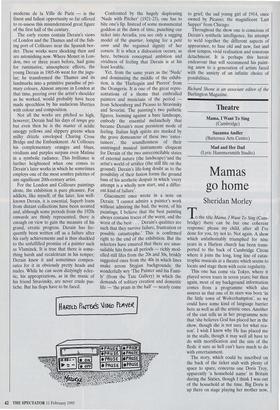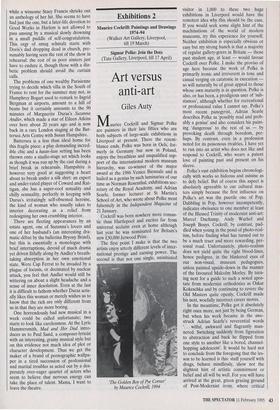Theatre
Mama, I Want To Sing (Cambridge) Suzanna Andler (Battersea Arts Centre)
Mad and Her Dad (Lyric Hammersmith Studio)
Mamas go home
Sheridan Morley
To the title Mama, I Want To Sing (Cam- bridge) there can be but one coherent response: please my child, after all I've done for you, try not to. Not again. A show which unfathomably triumphed for nine years in a Harlem church has been trans- ported to the back of Cambridge Circus where it joins the long, long line of catas- trophic musicals at a theatre which seems to locate and stage them with eerie regularity.
This one has come via Tokyo, where it played seven tours in seven years; but then again, most of my background information comes from a programme which also assures us that one of its stars was born 'in the little town of Wolverhampton', so we could have some kind of language barrier here as well as all the artistic ones. Another of the cast tells us in her programme note that 'she believes God has placed her in the show, though she is not sure for what rea- son'. I wish I knew why He has placed me in the stalls, though it may well all have to do with mortification and the sins of the flesh: it sure as hell can't have much to do with entertainment.
The story, which could be inscribed on the back of the ticket stub with plenty of space to spare, concerns one Doris Troy, apparently 'a household name' in Britain during the Sixties, though I think I was out of the household at the time. Big Doris is up there on stage playing her mother now, while a winsome Stacy Francis shrieks out an anthology of her hit. She seems to have had just the one, but a later-life devotion to Good Works in Harlem is not allowed to pass unsung by a musical slowly drowning in a small puddle of self-congratulation. This orgy of smug schmalz starts with Doris's dad dropping dead in church, pre- sumably having seen the rest of the show in rehearsal: the rest of us poor sinners just have to endure it, though those with a dia- betic problem should avoid the curtain calls.
The problems of one wealthy Parisienne trying to decide which villa in the South of France to rent for the summer may not, as Humphrey Bogart used to remark to Ingrid Bergman at airports, amount to a hill of beans but it certainly amounts to the 90 minutes of Marguerite Duras's Suzanna Andler, which made a star of Eileen Atkins over here about 20 years ago and is now back in a rare London staging at the Bat- tersea Arts Centre with Susan Hampshire.
Battersea is a less than ideal home for this fragile piece: a play demanding incred- ible chic and a haute-luxe setting has been thrown onto a studio-stage set which looks as though it was run up by the cast during a brief break in rehearsals. Hampshire is however very good at suggesting a heart about to break under a silk shirt: an expert and under-rated player of Coward and Rat- tigan, she has a super-cool sexuality and chilly sensuality, perfectly in keeping with Duras's irritatingly self-obsessed heroine, the kind of woman who usually takes to interior decorating as a relief from redesigning her own crumbling interior.
There are fleeting appearances by an estate agent, one of Suzanna's lovers and one of her husband's (an interesting dra- matic debut by the ballerina Bryony Brind), but this is essentially a monologue with brief interruptions, devoid of much drama yet driven fitfully along by Andler's breath- taking absorption in her own emotional state. Were Cap Ferrat to be invaded by a plague of locusts, or decimated by nuclear attack, you feel that Andler would still be wittering on about a slight headache and a sense of inner desolation. Even at the last it is difficult to fathom whether Duras actu- ally likes this woman or merely wishes us to know that the rich are only different from us in that they are more boring.
One horrendously bad new musical in a week could be called unfortunate; two starts to look like carelessness. At the Lyric Hammersmith, Mad and Her Dad intro- duces us to Paul Sand, a composer-lyricist with an interesting, grainy musical style but on this evidence not much idea of plot or character development. Thus we get the maker of a brand of pornographic wallpa- per in a tired succession of professional and marital troubles as acted out by a des- perately over-eager quartet of actors who seem to believe that nervous energy can take the place of talent, Mama, I want to leave the theatre.



























































 Previous page
Previous page